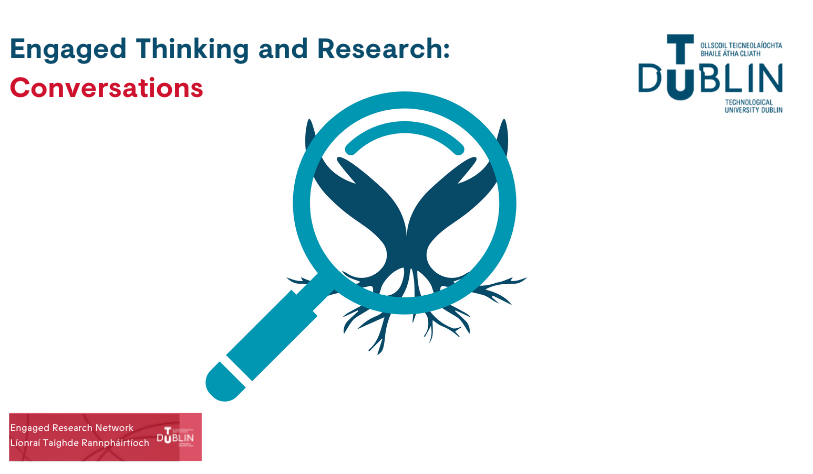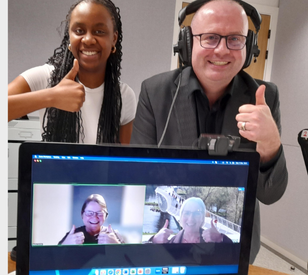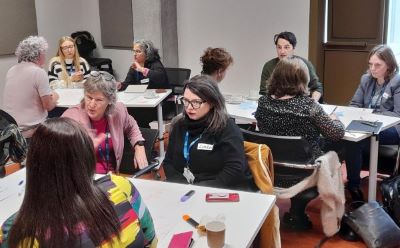.png)
TU Dublin’s Engaged Research Network is open to staff and PhD students interested in engaged research (*see definition below). It focuses on connecting and supporting people with an interest in engaged research, and developing and sharing resources and experience. The network will build TU Dublin’s capacity for Engaged Research, with a focus on the UN Sustainable Development Goals.
The Network currently has more than 130 members, and 3 main working groups:
- Mentoring programme development
- Hackathon/themed network events development
- Network identity and podcast series development
If you have any queries, or if you'd like to join the network, please contact Dr Catherine Bates at engagementandimpact@tudublin.ie.

We are proud to announce the launch of our brand-new podcast ‘Engaged Thinking and Research: Conversations.' This innovative podcast aims to shine a spotlight on the transformative potential of engaged research and innovation practices and foster meaningful conversations among researchers, practitioners, community partners, and policymakers.
‘What is Engaged Research?’ is a dynamic discussion featuring Sophie Duncan, Co-Director of the National Coordinating Centre for Public Engagement (NCCPE) in the UK, and Professor Catherine Woods, Director of the Physical Activity for Health Research Centre at the University of Limerick, Ireland. The conversation is facilitated by Dr Gordon Cooke, Research Impact Lead & Principal Investigator for Engagement and Impact at TU Dublin.
Listeners are invited to join the dialogue as the podcast delves into the relevance of engaged research in addressing societal challenges. This inclusive research approach, which emphasises collaboration and shared learning, has the potential to make a profound impact on society at large.
Sophie Duncan brings a wealth of experience, setting the strategic direction for the NCCPE’s work in the UK, and advising universities and policy-making bodies on community-university partnerships. She is also co-editor of the Research for All Journal, a leading publication on engaged research practices.
Professor Catherine Woods, a member of the University of Limerick's Physical Activity for Health Research Centre, offers valuable insights from her work on lifestyle, health, and technology. Her leadership on projects such as iPARC (the Irish Physical Activity Research Collaboration) exemplifies the power of collaborative efforts between researchers, policymakers, and practitioners.
Throughout the episode, the speakers unpack what it means to engage with communities in research, discuss best practices, and reflect on the potential of collaborative research to drive positive societal change.
TU Dublin’s Engaged Research Network invites everyone to tune in, be inspired, and take part in the conversation about how research can work with, and for, society.
Listen now on Spotify (or if you prefer you can read the transcript), and join us in shaping the future of engaged research!

Photo from left to right: (in person) Britney Madondo (TU Dublin 4th year Film and Broadcasting student who supported recording and editing) and Gordon Cooke; (on-screen) Sophie Duncan and Catherine Woods.
Greenhouse for Engaged Research in Education (GERE)
This is new initiative from TU Dublin’s Engaged Research Network, in collaboration with the Learning, Teaching and Assessment team, ran in March 2025. GERE supported lecturers planning or doing external engagement in their teaching to work with stakeholders to evaluate the impact of this work. The goal was to encourage lecturers to co-produce research outputs with external partners, such as conference posters, webinars or articles. You can find out more about it here: Greenhouse for Engaged Research in Education
TU Dublin's Engaged Research Network has started a pilot mentoring and peer mentoring programme, to support colleagues to develop their engaged research practices.
The 2024-5 pilot involves 3 pairs of colleagues, who are meeting monthly for 6 months. The pilot will be evaluated with all participants at the end of the academic year, and we hope to run it again in 2025-6.
If you'd like to express your interest in participating in 2025-6, please email catherine.bates@tudublin.ie.

*‘Engaged Research describes a wide range of rigorous research approaches and methodologies that share a common interest in collaborative engagement with the community. It aims to improve, understand, or investigate an issue of public interest or concern, including societal challenges. Engaged research is advanced with community partners rather than for them. ‘Community’ refers to a range of public research stakeholders, including public or professional service and product users, policy makers, civil and civic society organisations (CSOs) and actors’ (Campus Engage, 2017. Engaged Research: Society and Higher Education Working Together to Address Societal Challenges).

